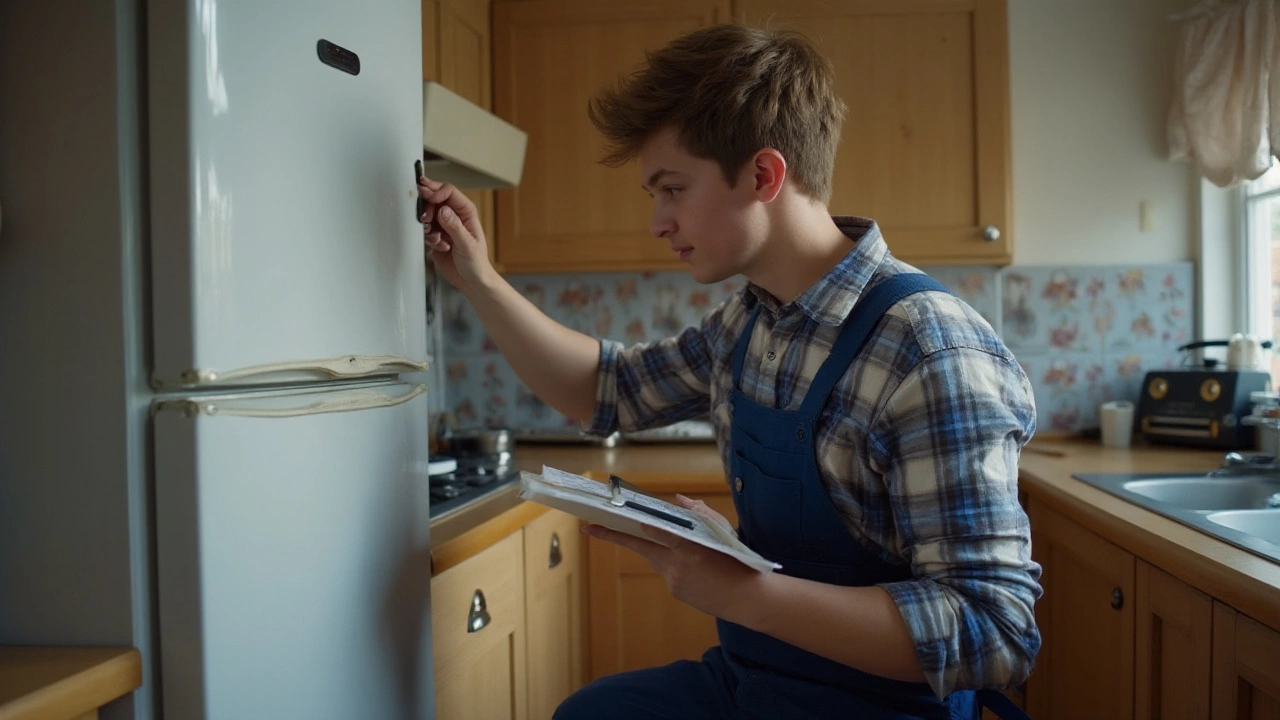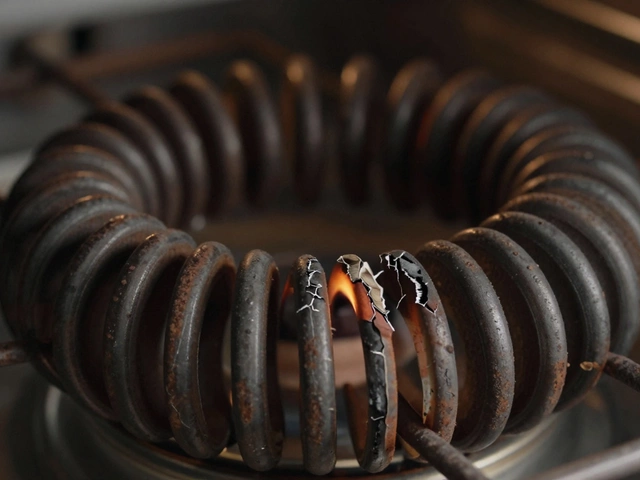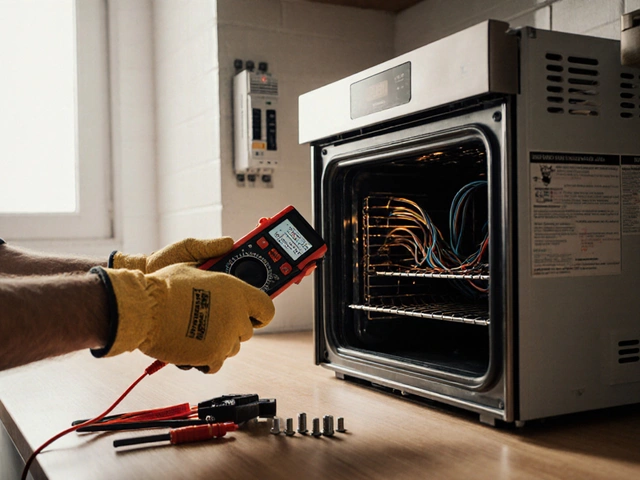In the hustle and bustle of modern life, a fridge freezer quietly works in the background, preserving our food and keeping our daily routine smooth. But when it hits the seven-year mark, questions about its functionality and efficiency often arise. Is it still the powerhouse it once was, or is it time to bid farewell?
Knowing when to repair an appliance versus when to replace it can save money and reduce environmental impact. In this article, we will take a look at factors that influence this crucial decision. Whether it's odd noises, inconsistent temperatures, or other common issues, we'll help you weigh the pros and cons of repairing an aging fridge freezer.
- Assessing Current Condition
- Common Fridge Freezer Issues
- Repair vs. Replacement Costs
- Energy Efficiency Considerations
- Getting More Life Out of Your Appliance
- Eco-Friendly Disposal Options
Assessing Current Condition
Before you dive into decisions about whether to repair or replace your seven-year-old fridge freezer, it is crucial to start with a thorough assessment of its current condition. Checking your appliance is not just about peering in to see if it’s still humming along; it’s about understanding how well it's performing its vital function. Begin by evaluating the cooling efficiency. If the fridge seems warmer than usual or struggles to maintain a consistent temperature, these could be warning signs of deeper issues such as a malfunctioning thermostat or seal problems. Examine the freezer section for any signs of frost buildup, which might indicate a faulty defrost system. You might find it beneficial to use a thermometer to verify these temperature concerns accurately.
Another aspect to scrutinize is the energy consumption. As appliances age, they often become less energy-efficient, leading to higher electricity bills. It’s worth noting that older models typically consume a lot more electricity compared to newer, eco-friendly options. If your electricity bill has been steadily climbing, your fridge freezer might be burning more power than it should be. To maintain an understanding of what’s normal, based on figures from the Association of Home Appliance Manufacturers, a fridge freezer manufactured in 2015 usually consumes around 600-800 kWh annually. If yours significantly deviates from this, you might have an underlying energy efficiency issue at hand.
Of course, the physical state of your fridge freezer also tells a story. Inspect for any audible irregularities, such as strange noises which can indicate mechanical wear and tear. Listen for rattling, humming, or clattering, particularly if the unit has gotten noisier over time. These sounds might mean anything from a simple leveling problem to more serious motor or compressor issues. It's also wise to determine if components such as the door seals remain effective. A simple test involving placing a piece of paper between the door and the fridge can help; if the paper slips out easily when closed, the seals are likely worn.
“A refrigerator is a long-term investment in your kitchen, and assessing its condition regularly helps ensure it continues to serve you effectively,” advises Stephen Bova, an experienced appliance repair technician.Evaluating these elements—cooling performance, energy consumption, physical condition, and even reliability records—can offer a comprehensive viewpoint on your appliance's health. If you keep records of any past repairs, this can also help gauge whether the frequency or type of repairs is abnormal, hinting it's possibly time for more serious intervention or replacement.
Common Fridge Freezer Issues
When your trusty fridge freezer starts acting up, it might seem like a sign that old age has finally crept in. Yet, not every hiccup signals the end. Knowing the typical problems can prepare you for what might come. One of the most frequent issues that people face is inconsistent cooling. Imagine opening the fridge door and feeling the unsettling warmth instead of a cool breeze. This often points to blocked vents or a faulty thermostat, both of which can disrupt the delicate balance required to keep your food fresh. Blocked vents can usually be resolved with a thorough cleaning, but a worn-out thermostat may call for professional intervention.
Another common trouble is the buildup of frost in the freezer compartment. This usually indicates a malfunctioning defrost system. Over time, the components like the defrost thermostat or heater might wear out, causing frost to accumulate where it shouldn't, potentially compromising your unit’s efficiency. Unattended, a simple ice nuisance can spiral into a freezer that refuses to keep things frozen. Regular checks and prompt repairs can deter this chilly woe.
According to Appliance Repair Specialist, 'Over 30% of refrigeration system failures are due to minor issues that could have been caught early with routine maintenance.'
Noisy operation is an annoyance that no one wants to deal with. If your fridge starts sounding like it's gearing up for takeoff, it might be time to investigate the condenser or evaporator fans. Dirt and debris often obstruct these fans, creating an orchestra of rattles and hums. A good clean and careful inspection can restore normalcy, sparing you the constant buzzing while you go about your daily activities.
Water leakage inside or beneath the unit can lead to bigger problems if ignored. Typically, this results from a blocked defrost drain or a cracked drain pan. The accumulation of moisture not only risks spoilage of your stored goods but can also help mold to flourish. Inspecting these areas is crucial, and solutions often lie in unclogging drains or swapping out defective pans. Addressing these concerns swiftly could prevent major water damage and unnecessary food waste.
Lighting issues can be deceivingly minor yet annoying. Sometimes, the fridge interior remains dark due to faulty light switches or bulbs that need replacing. While changing a bulb is straightforward, issues with the switch might require a deeper dive into the electrical setup of your appliance. With each blink and fade of the light, tackling these small headaches keeps your fridge functioning optimally.

Repair vs. Replacement Costs
When it comes to deciding whether to repair or replace a fridge freezer, the financial aspect often sits at the forefront of the decision-making process. It's essential to consider the costs involved in both options to make a sound choice. With a seven-year lifespan behind it, your appliance might be starting to exhibit some common signs of wear and tear. This is where understanding the cost implications becomes critical, as sometimes an upfront investment in repairs can extend the life of your fridge significantly compared to the cost of a brand-new appliance.
Repair costs can vary widely depending on the issue at hand. Common problems, such as a faulty thermostat, broken ice maker, or damaged door seal, might set you back anywhere from $150 to $300. On the flip side, more complex issues like compressor failures can escalate into the $500 to $700 range. It’s pivotal to weigh these costs against the price of a new fridge, which typically ranges from $1000 to $2000, depending on features and brand. The rule of thumb many appliance experts suggest is if the repair cost exceeds half the price of a new model, replacement might be the better option.
Industry veteran Jim Matthews states in an interview:
"Consumers often underestimate the lifespan improvements a simple repair can make. Not every breakdown means it's time for a trip to the appliance shop for a new model."Such insights can help guide homeowners to consider repairs when appropriate, extending the life of their freezer without the heavy expense of a replacement. Another factor to consider is the energy costs involved with older appliances. New fridges generally boast greater energy efficiency, potentially saving you money on your electricity bill in the long run, which should be weighed against repair efforts.
Additionally, some service providers offer discounts or warranties on particular repairs, which can sweeten the deal considerably. Thus, it’s worth shopping around and asking questions before committing to buy or fix. Consider creating a comparison table of known issues and costs:
| Issue | Repair Cost | Replacement Cost |
|---|---|---|
| Thermostat | $150 - $300 | $1000 - $2000 |
| Compressor | $500 - $700 | $1000 - $2000 |
| Ice Maker | $200 - $400 | $1000 - $2000 |
Energy Efficiency Considerations
As your fridge freezer ages, one of the most vital aspects to contemplate is its energy efficiency. Not only does an energy-efficient appliance help in conserving power, but it also trims down those pesky electricity bills that seem to creep up unexpectedly. Typically, appliances over a decade old can consume significantly more energy than their modern counterparts. However, with your fridge being seven years old, the technology is not entirely outdated yet some improvements have been made since its production.
When assessing the energy efficiency of your fridge, start by checking its energy consumption rating. Contrary to what some might believe, these ratings have a real impact on household expenses. A high-energy consumption appliance might lead to bills that feel like you've left your heater on throughout the summer months. Comparing your current model's energy usage with newer versions can offer an eye-opener on potential savings. According to the Energy Star program, upgrading to a new fridge freezer could reduce energy consumption by around 15% compared to models that are even just a few years old.
"Investing in an energy-efficient fridge freezer not only economizes your utility costs but also contributes to the global effort of reducing energy dependence," notes Sam Richards, an energy efficiency expert. This statement underscores how critical a decision regarding your fridge can be for both fiscal and ecological health.In some cases, addressing minor inefficiencies can extend your fridge's lifespan and improve its performance without purchasing a new model. Begin by inspecting the door seals to ensure they don’t allow cold air to escape, causing the appliance to use more energy than necessary. Make sure the inner temperature is set correctly—not too cold nor warmer than needed—as unnecessary adjustments can lead to increased energy consumption.
While contemplating these considerations, it may also be useful to implement other energy-efficient habits such as covering food to prevent moisture buildup, which can prompt the fridge to work harder. Also, mindfully placing ingredients in a way that allows cold air to circulate freely ensures efficiency. Although these steps are seemingly small, they collectively help in keeping the appliance running efficiently. In conclusion, balancing repair, retrofitting, and habits can postpone larger financial investments while enhancing energy efficiency. Ultimately, thoughtful energy management can make it worth holding onto your fridge freezer a little while longer.

Getting More Life Out of Your Appliance
Taking care of a fridge freezer that's been loyally chilling and freezing for seven years can seem daunting. Yet, with some attention, you can extend its life without breaking the bank. Start with regular cleaning. Dust and debris may accumulate on the condenser coils, typically located at the back or beneath the appliance. Dirty coils can lead to inefficient operation and even cause the fridge to overwork itself, ramping up energy usage. Make it a point to clean these coils every six months. Regular cleaning not only helps with efficiency but also keeps your energy bills in check.
Next, consider the seals around the doors, known as gaskets. They need to be in good condition to maintain a tight seal, preventing cold air from escaping. A simple check can reveal wear or tears. If you find any damage, replacing the gasket can be a straightforward DIY project. Not only does it stop air leakage, but it also extends the life of your fridge freezer. Cold air escaping from a damaged gasket forces the motor to work overtime, hastily wearing it out.
Another key area of focus is the temperature setting. Keeping the fridge at the right temperature is crucial for its longevity. The general advice is to keep your fridge set between 37° to 40°F and your freezer at 0°F. These temperatures ensure maximum efficiency without overworking the system. Make sure the fridge isn't overly full. Crowding can block air vents, meaning the fridge won’t cool properly and will consume more energy trying to keep up.
If you've ever heard strange noises coming from your fridge, it’s best not to ignore them. Unusual sounds could signal a range of problems, from simple fixes like a misaligned drip pan to more serious issues that require professional attention. Addressing these sounds early can prevent small problems from morphing into costly repairs.
It might be worthwhile to think about investing in a surge protector. It shields your appliance from voltage spikes, which are silent killers of electrical components like the compressor and the motherboard. A simple device can save you hundreds in potential repairs and extend the life of your fridge.
An annual check-up with an appliance technician can also catch issues that you might miss yourself. They can spot wear and tear, suggest maintenance tips tailored to your specific model, and offer insights into keeping your fridge running smoothly for longer. Modern fridge freezers often come with technology that simplifies troubleshooting. Smartphones and apps can even alert you when the appliance isn't operating at peak performance.
Peggy Woodward, a Senior Editor at Taste of Home, once noted, "Knowing how to maintain your appliances can add years to their life—and save significant costs on premature replacements."
Switching to energy-efficient LED bulbs often used in modern fridge freezers can also contribute to longevity and efficiency. While small, these components don’t produce heat like conventional bulbs, which can make the fridge use more power to stay cool. All these measures together can help you squeeze a few more years out of your trusty appliance, all while saving energy and keeping your kitchen running smoothly.
Eco-Friendly Disposal Options
When it comes to saying goodbye to your trusty old fridge freezer, prioritizing eco-friendly disposal methods is not just a responsible choice; it's an absolute necessity for our planet today. So how do we tackle this task in a way that benefits both you and the environment? First and foremost, familiarize yourself with local regulations and disposal guidelines to ensure you're on the right track. Many regions offer a variety of programs specifically aimed at ensuring that discarded appliances don't harm the environment.
Recycling centers are one of the most popular options for disposing of your fridge freezer sustainably. These centers often have the means to dismantle the appliance safely, separating harmful substances such as refrigerants and oils before recycling the rest of the materials. This is crucial, as improper disposal of these substances can lead to significant environmental harm. In fact, according to the Environmental Protection Agency (EPA), recycling one million refrigerators can prevent the release of as much greenhouse gas as removing over 870,000 cars from the road for a year!
Another option to consider is retailer take-back programs. Many retailers offer services to collect your old appliance when you purchase a new one. This option not only makes the process seamless but also guarantees that your old fridge freezer will be disposed of responsibly. It's worth checking if the retailer is part of any certified environmental programs, which can provide reassurance that your old appliance will be handled with care.
Donation is also a viable route if your fridge freezer is still in working condition, or only requires minor repairs that someone handy might be willing to undertake. Non-profits and charitable organizations often accept these donations to help families in need. Besides helping someone out, this option also minimizes waste accumulation in landfills, which is a win-win scenario.
"The first law of sustainability is to align with natural forces, or at least not try to defy them." — Paul Hawken
Before you set out the fridge freezer for disposal, ensure you've removed any hazardous materials first. Some components, like refrigerants, need to be removed by professionals, as they have the expertise to prevent any leaks or accidents. Depending on your region, some disposal services might require proof that a certified technician removed these substances.
If you're exploring creative avenues, you might consider upcycling the appliance. Although it requires a bit of artistic inclination, converting an old refrigerator into outdoor storage or a quirky garden planter can lend a unique charm to your backyard. Some people even transform them into insulation-infused storage units for seasonal items. With a little imagination, upcycling can be both rewarding and environmentally considerate, giving your old appliance a new life.
Finally, remember the community aspect. Participating in local appliance recycling days or community disposal events not only aids in effective disposal but also fosters a sense of environmental responsibility within the community. Many areas conduct these events regularly to help residents dispose of appliances without much hassle.
In conclusion, disposing of a seven-year-old fridge freezer in an eco-friendly manner involves several thoughtful options. Whether you opt for recycling, donation, or creative reuse, each step contributes to a healthier planet. Let's make sure we're doing our part by making responsible choices for old appliances.







